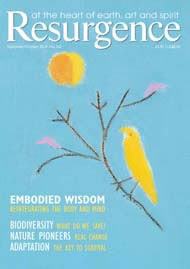Have you ever had the feeling that the universe is trying to tell you something, and you can no longer ignore its message? I am writing this in the same week that I began reading my first climate-change book in years. Called Eaarth, it is by the environmental writer and activist Bill McKibben, who explains that the extra ‘a’ in the title stands for ‘awful’.
I bought it because I had the feeling that this book would be different from all the others. I have not been disappointed. From the moment he starts writing, McKibben goes full-bore into the eye-popping truth: we had our chance, he says, a brief opening to steer a different course, away from the rocks. But we didn’t take it.
My reading of McKibben’s book also happened to coincide with the spectacular volcanic explosion of Eyjafjallajökull in Iceland on 14 April (which brought global air travel to a grinding halt for nearly a week) and with the unprecedented explosion of an oil rig in the Gulf of Mexico, which resulted in incalculable amounts of oil relentlessly gushing towards the shores of Louisiana.
I won’t deny it: these days I pretty much inhabit the ‘archetype of the apocalypse’ as a full-time denizen. The only thing that surprises me is that more folks don’t live there – that others can still manage not to be preoccupied or obsessed with the drastic meltdown of society, the economy, and the accelerating prospects of environmental cataclysm. Our utter helplessness in the face of what is happening is stunning.
Fortunately, McKibben is a no-frills writer. There are no ‘feel-good’ projections about an optimistic future in which we have all mysteriously ‘changed our consciousness’, and no hectoring about humanity’s devastating failure to live sanely on the planet. Just this excruciating X-ray of what worldwide ecocide actually looks like.
The frequency of hurricanes, for example, has risen by 75% in the last 13 years. There have been four times as many weather-related disasters in the past 30 years, and more than in the first three-quarters of the century combined. Polar ice is melting 50 years ahead of schedule and last year, lightning strikes in the Arctic increased 20-fold, igniting the first tundra fires ever observed.
Large forest fires now burn for four times as long as a generation ago, also pumping millions of tons of carbon dioxide into the atmosphere. And oil – the very basis of our modern, technologically intensive lifestyle – is disappearing. The costs of both environmental restoration and humanitarian disasters have become so prohibitive that the insurance industry is foundering, and we can’t possibly afford to repair things fast enough to preserve the planet we used to live on.
“Here’s all I’m trying to say: the planet on which our civilization evolved no longer exists,” McKibben writes. “The stability that produced that civilization no longer exists...The earth that we knew – the only earth that we ever knew – is gone…and there’s no use pretending otherwise.”
To read this book is to understand how all debates about whether or not climate change exists or doesn’t – whether it is a human-made calamity or just a hoax driven by politics and money – are hopelessly obsolete. At this point, such questions no longer matter. Recent provocative events alone make it clear just how much any alteration of the features of Nature affects the destiny of mankind, and vice versa: mankind’s activities irrevocably affect Nature. It is all one big feedback loop.
What we need to focus on instead, says McKibben, is how to survive what’s coming at us, because “we simply can’t live on the new Eaarth as if it were the old earth; we’ve just foreclosed that option”. From now on, he argues, we’re about keeping what we’ve got: maintenance, not squandering, has to be our mantra.
Our new life, however, is likely to be a lot harder than the old one, an uphill slog at best. These words were uttered even before the game-changing oil spill. Not squandering what we have becomes an almost surreal injunction as those precious oil reserves haemorrhage relentlessly into the sea with the potential to ultimately destroy it.






